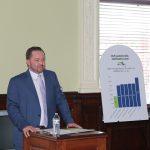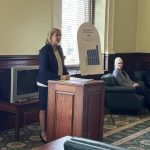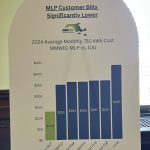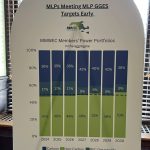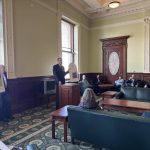Boston, MA – March 26, 2025 – The strength of the public power business model was lauded at the MLP State House Day, hosted by the Massachusetts Municipal Wholesale Electric Company (MMWEC), the Commonwealth’s designated joint action agency for municipal utilities, yesterday.
The advocacy day featured remarks by House Chair of the Joint Committee on Telecommunications, Utilities and Energy, Rep. Mark Cusack; House Chair of the Municipal Light Plant (MLP) Caucus, Rep. Kimberly Ferguson; Sen. Jacob Oliveira; Rep. Aaron Saunders; General Manager Joe Sollecito of the Mansfield Municipal Electric Department (MMED), and General Manager Chris Roy of Shrewsbury Electric and Cable Operations (SELCO), among others.
Remarks focused on the hallmarks of the public power business model: local control, local decision-making, not-for-profit, low cost and superior service. Displays and handouts highlighted the much lower rates of the MLPs, and their progress towards decarbonizing their power portfolios. The MMWEC member utilities are, in the aggregate, on pace to meet the 2030 MLP Greenhouse Gas Emissions Standard target of 50% carbon-free energy sales ahead of time, and are actively working towards the 2040 and 2050 targets.
Speakers discussed potential legislative and regulatory developments that could infringe on local control and local-decision making, which are hallmarks of public power, and cause significant increases to MLP rates. These regulations and potential regulations include the Clean Heat Standard, Building Decarbonization Clearinghouse and Large Building Energy Reporting.
Speakers also emphasized that MLPs offer incentives, through such innovative programs as MMWEC’s NextZero program, to decarbonize and electrify without mandate. These incentives are determined at the local level, based on the decisions of each local light board. The MLP rates, at a fraction of the cost of the rates of investor-owned utilities, ARE the incentive to electrify for customers.
At the same time, MMWEC is advocating for legislation to strengthen mutual aid provisions for MLPs, and to exempt utility vehicles from certain electrification mandates until the vehicles and charging infrastructure are more readily available.
“We appreciate everyone for coming out to learn more about why public power is a successful business model, and to hear our concerns about potential impacts on the way municipal utilities operate,” says MMWEC CEO Ronald C. DeCurzio. “Engaging with all stakeholders is critical to ensuring that MLP customers are not negatively affected by any policy changes at the state level.”
MMWEC is a not-for-profit, public corporation and political subdivision of the Commonwealth of Massachusetts created by an Act of the General Court in 1975 and authorized to issue tax-exempt debt to finance a wide range of energy facilities. MMWEC provides a variety of power supply, financial, risk management and other services to the state’s consumer-owned, municipal utilities. It is the largest provider of asset-owned generation for municipal light departments in New England.
